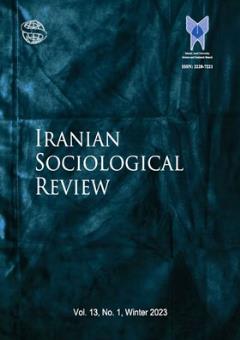National order, Political Stability, and Political Development
الموضوعات : مجله بین المللی علوم اجتماعی
Jafar rajabloo
1
,
مهرداد نوابخش
2
![]() ,
سروش فتحی
3
,
سروش فتحی
3
![]()
1 - PhD student in Sociology of Economic and Social Development, Faculty of Humanities, West Tehran Branch, Islamic Azad University, Tehran, Iran.
2 - استاد گروه جامعه شناسی، واحد علوم تحقیقات، دانشگاه آزاد اسلامی، تهران، ایران
3 - دانشیار گروه جامعه شناسی، دانشکده علوم انسانی ،واحد تهران غرب، دانشگاه آزاد اسلامی ، تهران، ایران
و مدیر گروه جامعه شناسی
الکلمات المفتاحية: social order, national order, political stability, political and social development, public participation,
ملخص المقالة :
Human society cannot survive without order, and that depends on the level of order and regularization. In different periods of history, the intensity and quality of order have been different, and the occurrence of crises such as wars, coups, etc. have had negative effects on the establishment and non-establishment of order and social cohesion. What type of order each society chooses and what components play a role in national order is related to the type of culture, social spirit, ideals and accepted values of that society. In general, the transition of human societies from traditional to modern requires that human societies coordinate themselves with the new order and pay attention to their essential differences based on internal conditions according to the conditions of presence. In this research, there is a connection between "national organization" as a macro concept at the level of society and "political development" as a subset of the development process, and the researcher's assumption is that; National order has a positive effect on the creation and maintenance of "political stability" and the nature of the "political development" process in the society through the creation of order and regularity, and the ground is provided to accelerate the realization of political development. The current qualitative research is a " library research” in terms of its practical purpose and collection method, and the method of data analysis is "explanatory.” The result is that if national order is observed among parts of a system, society provides the ground for political development
A- Persian sources
1- Ahmadi, Hossein and Moaidfar, Saeed "Democracy and political stability". Social issues of Iran. sixth year Number 1. Spring and Summer 2014. P. 7-35
2- Akhtarian Khorasgani, Akbar and Qolipour Moghadam, Farid. "Comparative Review of Political Development Theories". Scientific-Specialist Journal of New Research Approach in Management and Accounting. First year, number 3, winter 2016, pp. 126-139
3- Badi, the best. political development. Translated by Dr. Ahmad Naqibzadeh, Tehran, Qoms. 1376
4-Roche, Gay. Social changes. Translated by Dr. Mansour Voshoghi. Third edition, Tehran, Nashrani, 1370
5- Zarkani, Dr. Hadi and Azami, Dr. Hadi and Ahmadi, Rahela, "Investigation and identification of variables affecting the instability of the political system", Geopolitics Quarterly. 10th year Third issue. Fall 2013, pp. 76-94
6- Saunders, David. Patterns of political instability. Translator of Strategic Studies Research Institute. Tehran. Publications of the Research Institute of Strategic Studies. 1380
7-Su, Alvin.Y. Social change and development, a review of the theories of modernization, dependency, and world system. Translated by Mahmoud Habibi Mazaheri. With an introduction by Dr. Amir Mohammad Haji Yousefi. Fourth edition, Tehran, Institute of Strategic Studies. 1388
8- Sohraei, Alireza and Mahmoudinia, Amin. "A model of good governance; a framework for analyzing the political economy of Hashemi Rafsanjani's government (1376-1368). Quarterly Journal of Strategic Studies of Public Policy. Volume 8. Number 28. Autumn 2017. pp. 207-228
9- Gen Zhir, Irene, directing transformation in the third world. Translated by Ahmad Tedin. Tehran. the ambassador 1369
10-Moin, Dr. Mohammad. Persian culture. Fourth volume, eleventh edition, Tehran, Kabir Publishing Institute, 2016
11-Muthaghi, Dr. Seyed Ahmad and Karamzadi, Moslem. "Investigation of the effect of political stability on development". Politics Quarterly. Journal of Faculty of Law and Political Sciences. Course 41. Number 3. Autumn 2019. pp. 340-321
12-Moore, Wilbert. Social changes. Translated by Parviz Salehi. Tehran, 1381
13- Yegangi, Kamran and Begley, Amin. "Conceptual model of good governance". Management Science Research Quarterly. Second year. Number 5. Winter 2019. pp. 75-81
B _ Latin sources
1-Almond, Gabriel A. The intellectual History of the Civic Culture. In: Gabriel A. Almand and Sidney Verba (ed). The Civic Culture Revisited. USA. Sage Publications. Inc .1989-pp,1-36
2-Apter, David E. The Politics of Modernization. Fourth Impression. Chicago. The University of Chicago Press-1973
3-Bill, James A. and Hardgrave Jr, Robert L. Comparative Politics. The Quest for Theory. Charles E. Merrill Publishing Company. A Bell and Howell Company. Colombus, Ohio.1973
4-Collins English Dictionary. Harper Collins. Glascow, 14th Edition. August 2003.
5-Dawding, Keith M. and Kimber, Richard. The Meaning and Use of “Political Stability.” In: European Journal of political Resarch.No11. May2006 pp.229-243
6-Makyian, Seyed Nizamuddin and Rostami, Mojtaba.” Political Stability, Corruption, Democracy and Terrorism. In the Middle East and North Africa. In: International Journal of Business and Development Studies.Vol.11, No 1 (2019)-pp-59-82.
7-Oxford Concise Dictionary of Politics-Iian Mclean and Alistair Mc Millan (ed). Oxford University Press-2003.pp-414-415
8-Roxborough, Ian. Theories of Underdevelopment.
McMillan Education Ltd. London 1991


